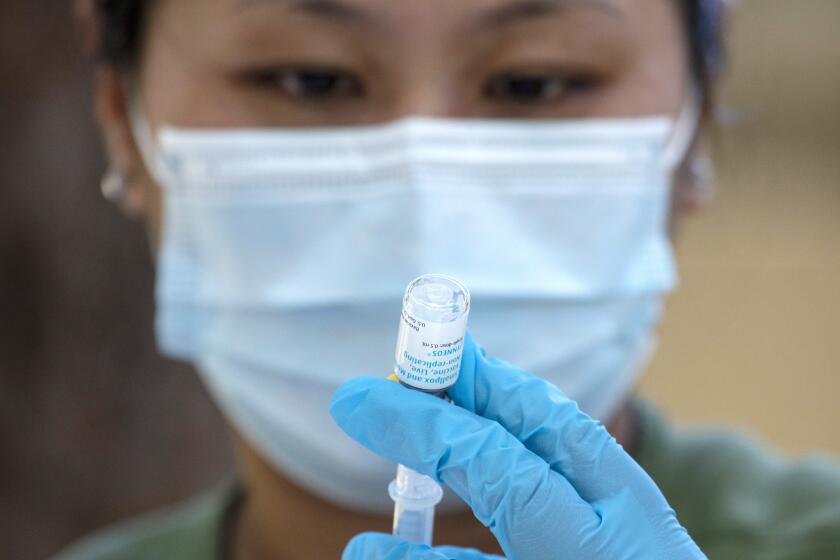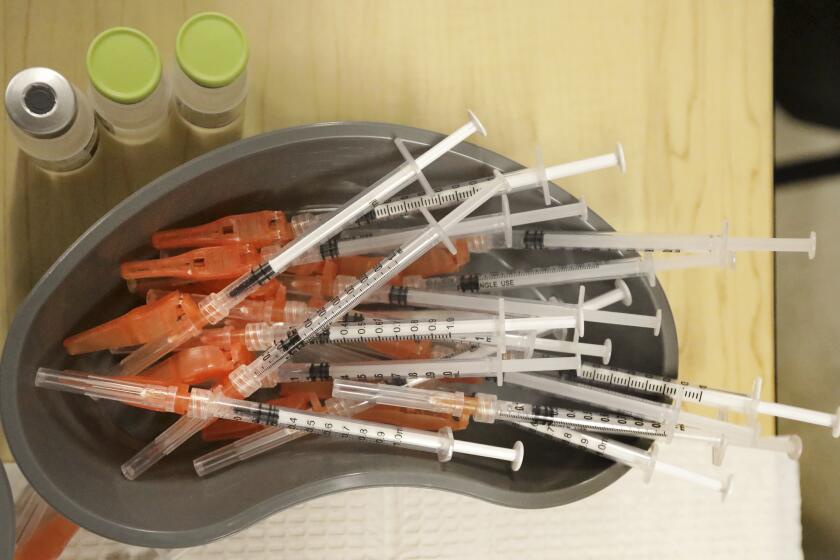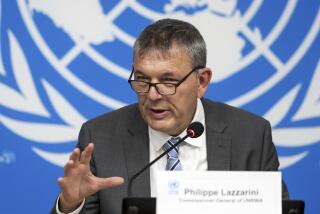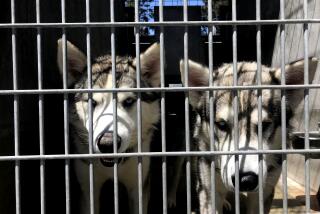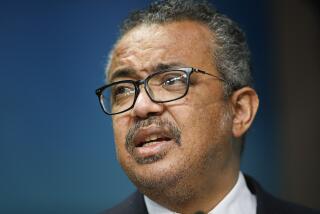WHO director in Asia accused of racism and abuse is put on indefinite leave
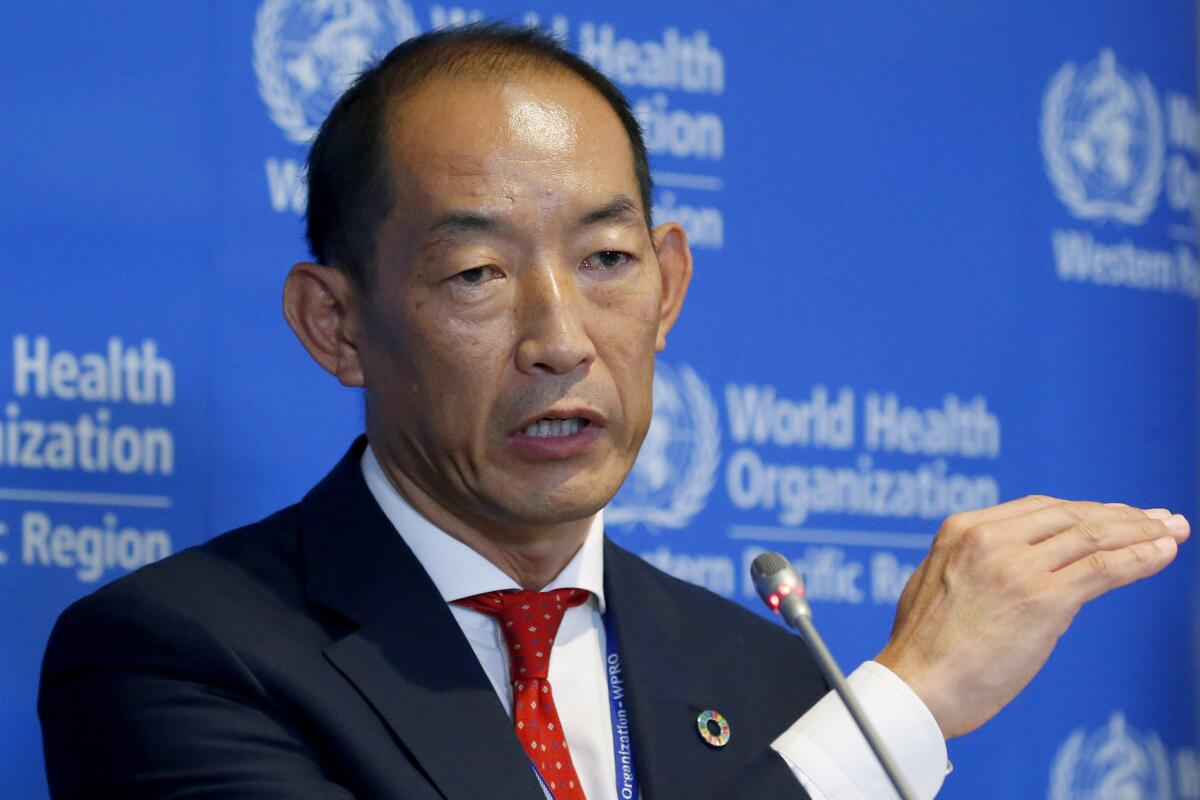
- Share via
LONDON — The World Health Organization’s top director in the Western Pacific, Dr. Takeshi Kasai, has been indefinitely removed from his post, according to internal correspondence obtained by the Associated Press.
Kasai’s removal comes months after an AP investigation revealed that dozens of staff members accused him of racist, abusive and unethical behavior that undermined the United Nations health agency’s efforts to stop the COVID-19 pandemic in Asia.
WHO Director-General Tedros Adhanom Ghebreyesus told staff in the Western Pacific in an email Friday that Kasai was “on leave,” without elaborating. Tedros said Deputy Director-General Dr. Zsuzsanna Jakab would be arriving Tuesday in Manila, the WHO’s regional headquarters, to “ensure business continuity.”
Two senior WHO officials who asked not to be identified because they were not authorized to speak to the press said Kasai had been put on extended administrative leave after internal investigators substantiated some of the misconduct complaints.
In a statement, the WHO said it was unknown how long Kasai would be away. The agency said that the investigation into his conduct was continuing and that it was believed to be the first time a regional director had been relieved of his or her duties. Kasai did not respond to requests for comment but previously denied that he used racist language or acted unprofessionally.
In January, the AP reported that more than 30 unidentified staff members sent a confidential complaint to senior WHO leaders and members of the organization’s executive board, alleging that Kasai had created a “toxic atmosphere” in the WHO’s offices across the Western Pacific. Documents and recordings showed that Kasai made racist remarks to his staff and blamed the rise of COVID-19 in some Pacific countries on their “lack of capacity due to their inferior culture, race and socioeconomics level.”
Experts around the world have pledged to change the disease’s name to something that doesn’t carry the weight of stigma. But tossing out the old term is easier than deciding on a new one.
Several WHO staff members working under Kasai said he improperly shared sensitive COVID-19 vaccine information to help Japan, his home country, score political points with its donations.
Days after the AP report, Tedros announced that an internal investigation of Kasai had begun. Several months later, however, WHO staff members alleged that Kasai was manipulating the inquiry. In a letter sent in April to the executive board, the agency’s top governing body, the staff members wrote that Kasai had ordered senior managers to destroy any incriminating documents and instructed IT staff “to monitor emails of all the staff members.”
Kasai is a doctor who began his career in Japan’s public health system before moving to the WHO, where he has worked for more than 15 years.
The removal of a regional director at the WHO, even temporarily, is “unprecedented,” according to Lawrence Gostin, director of the WHO Collaborating Center on Public Health Law and Human Rights at Georgetown University. “There have been a lot of bad regional directors at WHO, but I’ve never heard of action like this,” Gostin said.
COVID-19 vaccines that better match today’s dominant Omicron strain are expected to roll out soon, but how much will they help?
Any withdrawal of support from Japan for Kasai could hasten his dismissal.
Kasai’s removal stands in stark contrast to the WHO’s past reluctance to discipline perpetrators of unethical and sometimes illegal behavior, including during the sex abuse uncovered during the Ebola outbreak in Congo from 2018 to 2020. More than 80 outbreak responders under the WHO’s direction sexually abused vulnerable women; an AP investigation found senior WHO management was informed of multiple exploitation claims in 2019 but refused to act and even promoted one of the managers involved. No senior WHO staff members linked to the abuse have been fired.
“WHO’s reputation was shattered by those allegations,” Gostin said, calling the lack of accountability in Congo “truly outrageous.” He welcomed the disciplinary action taken against Kasai and called for the WHO to release its investigation in some form.
Gostin and other public health academics said that if the agency’s executive board determines that Kasai violated his contract by engaging in the racist and abusive conduct alleged, his contract could be terminated.
The WHO’s own staff association urged Tedros to take action against Kasai at a meeting in June, saying that failing to do so “would be a tragic mistake,” according to a memo from the private briefing.
“If swift action is not taken ... the results may be regarded as questionable at best, fixed and farcical at worst,” the staff members warned Tedros. “If [Kasai’s] wrongdoing is proven, the assumption will be that many other items were swept aside to save face.”
Before Kasai was put on leave, the WHO’s Western Pacific office had planned a town hall this week to address “workplace culture,” including concerns about racism and abusive conduct. In an email to staff Saturday, Dr. Angela Pratt, a director in Kasai’s office, announced that the meeting had been postponed.
More to Read
Sign up for Essential California
The most important California stories and recommendations in your inbox every morning.
You may occasionally receive promotional content from the Los Angeles Times.
